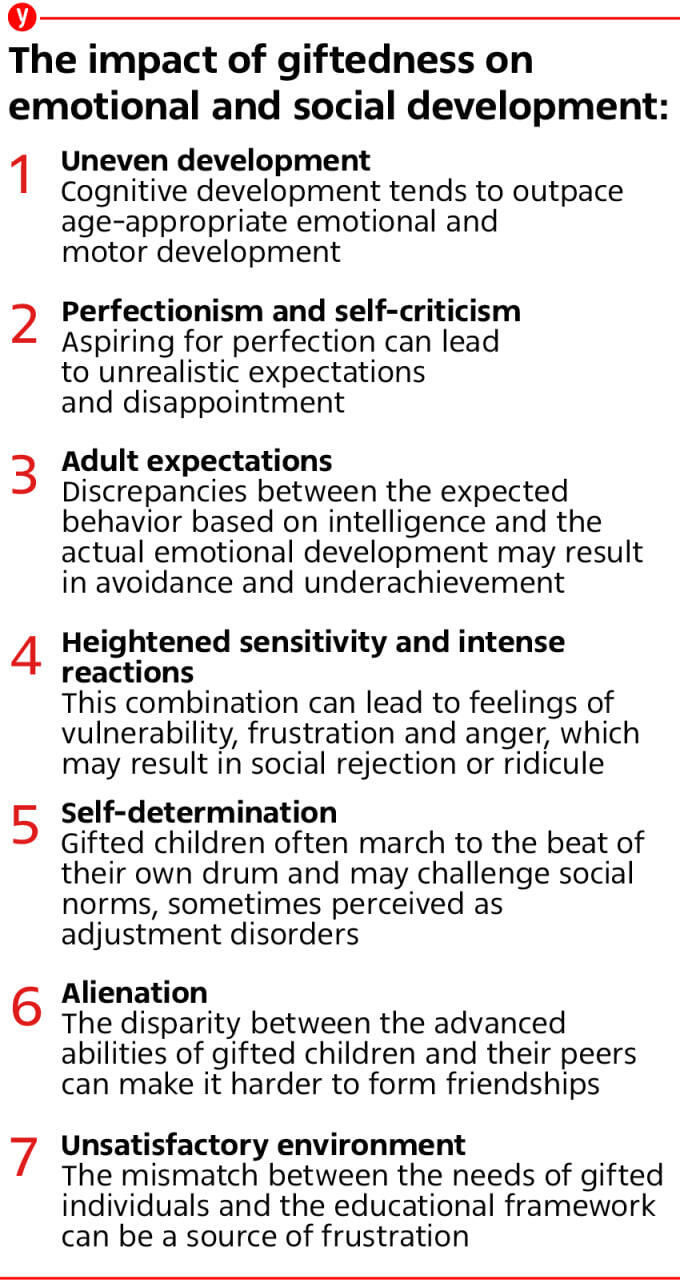Getting your Trinity Audio player ready...
”An eight-year-old was recently diagnosed as a gifted, sensitive, gentle child. He can’t enjoy life at all. Nothing interests him. He has crying fits and doesn’t know why. He has suicidal thoughts (“there’s no point to life”, “I wish I’d never been born”). Although he expresses a great deal of love, he’s never happy. He never plays with friends. As a rule, he’s glued to a screen. What can we do? I’m just so sad and lost.”
Read more:
These gloomy lines were recently posted on one of many forums for parents of gifted children. Anyone who isn’t gifted, has never raised a gifted child or doesn’t know gifted children very well, might think that this boy is the exception. He isn’t. It may well be an extreme case but, for many gifted children, the feelings of otherness, depression, alienation and frustration come with the territory.
The general definition of giftedness is the human ability expressed by particularly high interpersonal and intrapersonal intelligence. More focused definitions of the term are contingent on time and where the child lives: In the United States, for example, giftedness is defined solely based on an IQ of 130 upwards. By this criterion, 3% of the world’s population is gifted. In Israel, a gifted child is one who has passed a special Education Ministry test designed to identify gifted children, conducted for all second-grade children. Procuring this coveted label allows children to study in special classes.
The word “gifted” is automatically associated with success. A gifted child is regarded as a more intelligent child with greater potential for greater success. Who wouldn’t want to raise a living and breathing potential for success? Parents do everything within their power to have their child classified as exceptionally talented, having all their child’s wonderfulness affirmed. There are parents who enroll their children in courses coaching them for the special test. Others work with their children at home. And some parents, finding it hard to accept the fact that their child didn’t pass the test, appeal decisions. That’s how it goes. Everyone wants to be in the club.
But no one talks about the cost of giftedness.
“When we say, ‘a child with special needs’, we mean a child with various problems: mental retardation, a handicap of some kind, autism, behavioral problems, violence, etc. But gifted children are also children with special needs,“ says psychotherapist and relationship counselor Herzela Zach.
“It’s hard to associate ‘giftedness’ – regarded as positive, something everyone wants - with ‘special needs’ - evoking withdrawal, sympathy and possibly even fear. In practice, these children have particular problems and those raising them deal with complex challenges and they need direction, advice and support – just like parents of children with special needs. Parents want a gifted child who’ll get into [IDF elite intelligence unit] 8200 and conquer the world, but they forget that gifted children pay a price for being what they are. It’s not all bright and shiny.”
Zach knows what she’s talking about. At her clinic, she sees parents who, at some point, realized that this sense of pride comes with enormous difficulties and complex dilemmas.
“There’s a huge discrepancy between a gifted child’s cognitive and intellectual development and their social and emotional development: A six-year-old who’s reading a wide variety of books at home and possesses a broad vocabulary starts first grade. On his very first day, he realizes he’s not like everyone else. He’s different. He’s the only child in his class who thinks and talks the way he does. He’s not equal within a group of his peers.
Meanwhile, his emotional development is generally like that of any other six-year-old. A gap develops, confusing and frustrating everyone. How should this child be treated? As an adult who doesn’t align with his actual age, or as a six-year-old who doesn’t align with his intellectual abilities?”
“Problems arise from the expectations bestowed on a gifted child, coupled with the tension between the desire to fulfill the child’s potential and the desire to just be a kid who may want too much, talk back or rebel. Expectations are often rooted in the parent’s narcissism. Parents sometimes view the child as a kind of extension of themselves, expecting the child to make all their fantasies come true - because they can, because they’re gifted. These expectations become a burden, a huge weight on very small shoulders.”
Just leave them be or not?
Gifted children are covered by the Education Ministry's Department for Gifted and Outstanding Students which operates two special frameworks for unique studies: classes for gifted students in regular schools in which students study year-round, and centers for gifted students operating enrichment programs one day a week, the students attending regular school programming the remaining days of the week. Classes for gifted students, coupled with grade-skipping used to be popular “solutions” for especially talented children. Such classes operate today only in a limited number of schools, mostly in the larger cities.
When a family learns they have a gifted child, they must choose an appropriate framework. Usually, gifted children have difficulties integrating into regular frameworks. They get bored, tend to have (possibly unnecessary) arguments with teachers and are not stimulated enough. They may become “trouble makers”, irritating both teachers and fellow students. The child, nonetheless may choose to remain in a regular class just to be like everyone else.
“Parents come to me with the dilemma of whether or not to place their child in gifted student’s classes,” Zach tells us. “It means extracting a third-grader from their natural environment and placing them in a different class where they don’t know anyone – just to develop their intellectual abilities. The class is a kind of bubble to which children come from geographically diverse areas. Such a move can lead to complex emotional problems.”
“A further option would involve missing one regular school day each week, replacing it with attending a gifted students center. These days may prove enriching for the child, but come with a cost – missing one day’s school every week marks the child as ‘special’ - and the child’s classmates may or may not like kids who are special.”
But the child really does need an extraordinary level of stimulation. What’s the solution?
“There’s no one solution for gifted children. There’s no magic formula that works for everyone. You need to find tailor-made solutions for each specific child from each specific family. What might work for one gifted child could prove disastrous for another. You need to really know the child and gauge the emotional and social aspects at play, the child’s needs and how well they will be able to integrate into a new framework. You also must ensure that these needs are those of the child, rather than their parents’, or the system’s.”
How does a gifted child fit into a family?
“If they are the only gifted child among ‘regular’, or even below average, brothers and sisters it can lead to jealousy. The additional attention these children receive at home, being taken to after-school enrichment programs, etc. drains family energy, and everyone feels it. The child is viewed as privileged and the child’s siblings may be angry with their parents playing favorites.”
“The big question for parents is how to provide an appropriate space for a gifted child. The biblical story of Joseph is very telling: Joseph is the special child and his brothers become jealous of him and want to get rid of him. Although this story is clearly extreme, such experiences are commonplace There’s an extraordinary child in the family, and the family must live with it in some way. “
How do other children perceive gifted children?
“Invariably as conceited and show-offs. The challenge is how to curtail these narcissistic elements. A gifted child must be taught to develop feelings of empathy towards other children. They must be trained to make them want to help and care for other children and they must be taught to understand that every child can be talented and successful in other fields and that they can learn from them. They need to know how not to enter conflict situations, how to make them understand that being good at science, doesn’t make other children stupid. Children not diagnosed as gifted must be respected and much can be learned from them.“
The child is very sensitive
“The main source of distress for gifted children is having to spend long hours each day with people when, quite rightly, for fear of being misunderstood, you can’t really say what you think about them. This distress is compounded by the need to conceal your true abilities, even from the teachers who - to put it politely – aren’t really equipped to address the special needs of gifted children” says Hanna David doctor of educational psychology and counselor to gifted, talented and creative and their families.
“Gifted children are bored. Their classmates treat them differently. They’re not surrounded by people with similar interests. They need to simplify their language or at least tone down displaying their knowledge or abilities so as not to appear different. Teachers may frequently ask a gifted child to concede to other students, or at least understand them. Teachers are invariably hostile towards students taking days off to attend enrichment days and only include them in lessons if no other child is joining in.“
What can parents do to alleviate these problems?
“As gifted children are usually surrounded by people who cannot provide responses to their sensitivities, the home must provide a safe space. Gifted children cannot expect empathy from their friends. Six-year-olds can’t comprehend that one of their friends knows things they might only know when they’re nine. Gifted children quickly learn not to share their knowledge and achievements. If no one at home is listening to them either, they’ll become increasingly lonely, their mental health and behavior deteriorating.”
“Parents must remember that most, if not all, teachers are not trained in the didactics of gifted children. Most mental health professionals who don’t treat gifted children, aren’t trained in these fields either. So, gifted children may often find themselves victims of the ignorance of the adults teaching, educating and treating them. Even if the teachers were trained to respond to the child’s cognitive needs, curiosity, creativity thirst for learning, schools would not be able to provide these responses. Filling this void requires a lot of work, effort and money. Much of the teaching that the child needs cannot be conducted at home, but rather demands appropriate frameworks.”
'Gifted children are raised to be lazy'
“At a very early age, gifted children realize they’re different, that they think differently. They think and comprehend faster and at a deeper level. Very early on, they’re hit with the reality that they’re more intelligent than their parents - and that’s a real problem. I would think that, in some respects, being gifted is not unlike being gay. The sense of otherness starts very young. You don’t know what exactly you’re different from, but you do understand you’re not like everyone else. What you’re interested in doesn’t interest anyone else” says Yonatan Gilon, diagnosed as a child as gifted.
Were you the smartest kid in your class?
“Definitely. Even before the official third-grade diagnosis, even before I was told, I felt a massive gap between myself and the others. I wouldn’t say that I was socially lonely, but the boredom was driving me crazy. When they explained something in class for the fifth time, I found myself saying ‘Really? This again?’ I’d catch out the teachers on their mistakes and prove them wrong. I was never arrogant toward other children, but it comes out eventually, even unintentionally. It’s enough just being the one answering correctly in class.”
Gilon has taught gifted children and even headed the Larom School for gifted children in Kiryat Malachi.
“Teaching gifted children, I felt I had to tell them to know to shut up sometimes because it’s annoying. By the time you’re 15, you understand that on your own, but not when you’re eight. If the teacher asks a question, you just don’t answer. You’re doing her teaching for her and you don’t realize how much space you’re taking up. As far as you’re concerned, the teacher asked so you answered. It makes you that irritating kid in the class that no one can stand.”
Did you understand that by the age of 12?
“Yes. I just grasped that I was looking in the wrong direction. I reached the point where I was lacking vocabulary, that slang had changed and I didn’t understand the world outside. Something just wasn’t right. The class for gifted children in which I was placed wasn’t in my neighborhood, but rather a 45-minute bus ride away. When you’re traveling great distances to school, you lose something critical. You don’t have friends nearby and you have no one to hang out with in the afternoons. I was very lonely. It was a kind of prison, a positive prison, but a prison nonetheless. I tried keeping in touch with friends in my own neighborhood. I was a kid and I wanted to be with my friends. That’s why I left in the end. I wanted to be normal. It wasn’t some kind of act of defiance. I stayed friends with some of the kids from the gifted class. I wasn’t complaining. I just needed to make a choice.“
Would your life have been different if you’d have stayed in the gifted children’s program?
“Beyond doubt. Yes. I couldn’t say whether for better or worse. At the end of the day, I have friends from the gifted children’s program who have gotten much further than I have. In some ways that make me sad. That said, I don’t know if I could have been like them – do the things they’ve done. Maybe the social isolation would have been harder for me than for them. I don’t tell myself how great it was that I left, but I also don’t say it was a mistake.
I’m just saying that this move changed my life. I was failing in the gifted children’s class. It’s not like that anymore in most of the country. My experiences are not relevant today. What is relevant is not what’s going on in the gifted children’s classes, but rather in society at large. Being gifted is being marked positively. From the age of eight, your reputation goes before you.”
“When they keep telling you you’re the top 1% and you’re treated as the top 1%, you believe it. But what does being in the top percentile mean? It means you’re the smartest kid in your grade. Not the smartest kid in town, not the smartest kid in your area, not the smartest kid in the country, not the smartest kid in the world. Just the smartest kid in your grade. The difference between the best kid at soccer in the grade, and a man who makes a living playing soccer is immense. One in a hundred just isn’t good enough, but everyone’s talking about you like you’re the next Ronaldo. Being treated like this ensures you won’t be the next Ronaldo.”
“Gifted children are raised to be lazy. It wastes almost all of their innate advantages. In my role as headteacher of a school for gifted children, I’ve often asked gifted children if a non-gifted friend of theirs spends ten hours learning something, without defining the subject, how long would it take them to reach the same level of understanding? I.e., what’s their relative advantage? They usually say it would take them one hour – so they believe they have a tenfold advantage. Deciding you’re ten times smarter without knowing at what is crazy. They’d reached this assumption because of what they're constantly being told. How much faster is Ronaldo than his team-mates? By a few percent. There’s always someone breathing down your neck.”
Although a child’s giftedness and special needs are a direct result of their being different, even without this, you’re raising them in a way that makes them have special needs - impotent by choice. You give the child the feeling they’ve already completed pilot’s training – but they’re in third grade. This was my experience. I was constantly reminded of my giftedness. I wasn’t being conceited, but I had the sense that life would take me to great places without trying too hard. The gap between reality and what they make you out to be is too great.“
“I discovered, quite late, that I found it hard to read long texts. I can’t read books at all, whatever the subject. It loses me too quickly. I soon realized that people could read 900-page books and really understand what was going on, and I didn’t possess these skills. When I met my wife, I lied and told her I read books. I filled bookshelves with books I hadn’t read and didn’t plan on reading. I realized this very late, because I was constantly being told that I was very talented, successful and wonderful. It was hard for me to believe that I couldn’t carry out the simplest of tasks. My problems were manageable and I can conduct a regular, ordered daily life despite this late discovery. It’s much harder if you only find out these problems when you’re 30.“
What is your advice to parents of gifted children?
“They should explain to the child that being gifted is ‘nice to have’ – but no more. If they don’t learn how to behave like everyone else, they’ll create a gap that you may be unable to bridge. Why should a single childhood diagnosis influence a person’s life so much?”
For as long as she can remember, Ruth Zarhi has been surrounded by gifted people. She is the mother of both a gifted son and daughter, and many of her friends are gifted. She holds a master’s degree in organizational and educational consultancy and lectures team dynamics in universities and owns a clinic for coaching gifted people.
“I wanted to find out who a gifted person really is, what their abilities are and what of these abilities are manifested and which are not. I also wanted to learn what a person diagnosed as gifted as a child, isn’t demonstrating as an adult - while children not classified as gifted may be very successful as adults. “
Could a gifted child grow up not to be a gifted adult?
“He’ll always remain gifted, but there’s a huge difference in the classification of a gifted child and a gifted adult. When we talk about gifted children and teenagers, we’re talking about potential, the ability to reach special achievements based on extraordinary talents. When we talk about gifted adults, it’s more concrete: It’s about the ability to carry out tasks at an extraordinarily high level. “
What challenges do gifted adults face?
“Firstly, when they tell themselves they have a natural talent and then they fail, they believe they just don’t have those abilities. They’re very hard on themselves. They can’t deal with failure. They don’t see failure as an opportunity.”
“Secondly, gifted adults find it hard to work in teams because those around them don’t understand how fast they’re thinking. Five minutes into a work meeting, a gifted person knows where the meeting’s going and they’re five steps ahead. They try to move the meeting along. Other team members can’t understand why they’re changing the subject, moving on so quickly or being disruptive. They just don’t understand each other.”
It sounds very lonely.
“Yes. It’s sometimes very lonely. There are complex aspects to being gifted in the workplace and it can be hard, but the environment must understand that it’s a huge boon. Big companies like Microsoft now have human resources divisions assisting the talent – gifted people with outstanding abilities – because they understand it pays off. You have to give these people the supportive structures they need because, at the end of the day, they’ll advance the company, provide solutions, shorten procedures and will shine with new, original ideas. Gifted people can do amazing things if you just let them.”
“I don’t think you need a division made up of just gifted people. Quite the opposite. A gifted person must be integrated into a regular work team. If all the team members are open and patient, it can work wonderfully and can help everyone develop and grow.










